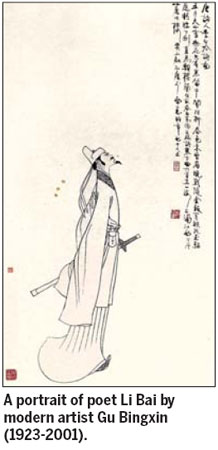Li Bai poems thrill Canada
The poems of Li Bai (AD 701-762) were celebrated on Monday night in Vancouver when works of the famed literary master were recited in 10 languages as part of the ongoing Asian Heritage Month in the Canadian city.
Staged by the World Poetry Extravaganza, a group that works to promote appreciation of the great poets of the world, the life story of Li Bai in the Tang Dynasty (AD 618-907), the peak period for Chinese poetry, was celebrated in Richmond, a neighboring satellite city to Vancouver where Chinese make up nearly 50 percent of the population of 193,000. Li Bai's extravagant imagination and striking imagery resulted in some memorable poetry as he often used metaphors to explain the unexplainable. Around 1,000 of his poems have been saved for posterity.
While the poet's works have been kept alive for centuries in China, they did not reach a  Western audience until 1862 following a French translation. In 1901, H.A. Giles produced an English translation, while in 1915 Ezra Pound, the famed expatriate American poet, came out with a Japanese translation Cathay.
Western audience until 1862 following a French translation. In 1901, H.A. Giles produced an English translation, while in 1915 Ezra Pound, the famed expatriate American poet, came out with a Japanese translation Cathay.
Jan Walls, a retired academic who holds a doctorate in Chinese literature, said he first encountered Li Bai as an undergraduate. He explained to the audience about the poet's great love of wine and how in caricatures he is always depicted looking up, toasting the moon.
The 70-year-old Walls said he was particularly attracted to Li Bai's works because of his humor and romantic sensibility, calling him one of China's greatest poets along with Du Fu and Wang Wei.
Li Bai, was a great traveler in his time who wrote wherever he was, "commemorating events in an unforgettable language," said Walls.
"I have always been attracted to the philosophy of Taoism, not as a religion, but as a philosophy. I think we are finding out through the state-of-the-art physicists that the nature of reality is very close to the way that Taoist thinkers like Li Bai, and the masters he learned from, described the universe and the way nature works," he said.
"His themes are universal. They usually deal with the appreciation of nature and nature is eternal. They have to do with things that you and I and everybody deals with - the joys of reunion, the sorrows of parting, the majesty of mountains and oceans, birth, aging, death, all the aspects of life."
Joanne Arnott, a mother of six and an author of six poetry books, recited Li Bai's poem Jade Staircase Lament after two of her children had earlier read Li Bai's poems, Alone Looking at the Mountain and Clearing at Dawn.
The Manitoba native said, "I really enjoy his capturing of peaceful moments. A lot of the poems I was re-reading today were farewells, going to see a monk and the monk is not there. But the feeling of beauty is there, even though his reason for going was not fulfilled, he is still satisfied."
With the various speakers reciting Li Bai's works in Korean, Spanish, English, Mandarin, Tagalog (the Philippine language), Romanian, Greek and Croatian, it was Dr Hadaa Sendoo, a World Poetry Ambassador, who provided the most memorable performance with his recital in Mongolian.
"Li Bai and his works represent China's splendid culture and civilization. That's why I chose Li Bai as the poet on the occasion of the Asian Heritage Month," he said.
Lawrence Lim, a Singaporean whose father came from China's Fujian province, said he felt honored that Li Bai's poems are celebrated around the world, adding it reflected an international recognition of Chinese tradition and culture. He said that Li Bai would probably enjoy British Columbia, a province of natural extremes where towering mountains meet the ocean in dramatic fashion.
"He wrote about people and the surrounding scenery, about creation and nature, which never changes. He wrote those poems thousands of years ago, but when you look at the mountains today in say Howe Sound (the area around Vancouver); it's the same green mountains. It's the ability to express human feelings and how they are linked with nature that really reveals Li Bai's incredible literary skills."
 0
0 







Go to Forum >>0 Comments